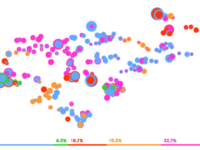Case Study
Monitoring of the Implementation of the Access to Information Act in the Federal Executive Branch
With the maturing of the Transparency Policy in the Brazilian Federal Executive Branch, there was a need to broaden the assessment of the implementation of the Access to Information Act. The innovation here lies in the methodology adopted, which was previously quantitative and is now also qualitative, allowing an improvement in the answers provided to citizens and the extension of the transparency culture, favoring all stakeholders: public bodies under assessment, citizens and the Government.



